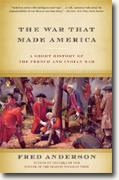The War That Made America
Fred Anderson
book reviews:
· general fiction
· chick lit/romance
· sci-fi/fantasy
· graphic novels
· nonfiction
· audio books
· author interviews
· children's books @
curledupkids.com
· DVD reviews @
curledupdvd.com
newsletter
win books
buy online
links
home
for authors
& publishers
for reviewers

 |
The War That Made America: A Short History of the French & Indian War Fred Anderson Penguin Paperback 320 pages November 2006 |
|
The War That Made America
How did George Washington get the military training he needed to become the brilliant strategist he was and later the first president of America? By his participation in the French and Indian War, a costly and bloody one that lasted seven years (1754-1760). He fought then as a loyal soldier for the British empire (and their Indian allies) against the French, their American territory’s colonies (called, collectively, New France) and their Indian allies. Though many Indian tribes participated on either the French or the English sides during the war, the Iroquois League successfully played both sides against the middle, at times helping or fighting against both groups. In a touch of irony, the British government was the force behind fostering a sense of unity among the American colonies in an attempt to get them to fight jointly against their common enemy, France. To attain this end, Anderson writes, the British government appointed Major General Braddock as “Britain’s viceroy in North America.” The British government desired Braddock “to impose a degree of unity on the colonists that they had never before known.” The roots of the American Revolution were very much a product of the French and Indian War, indeed, making the title The War That Made America The Six Nations, or the Iroquois League, composed of the Mohawk, Oneida, Onondaga, Cayuga, Seneca, and the Tuscaroras tribes, was a formidable empire in its own right. Fred Anderson writes eloquently about the Indians’ role in the French and Indian War and how they influenced its outcome both diplomatically and through the use of warfare. They were the puppets of no one, hiring themselves out to whichever side that, at the time, best met their own goals and desires. To become more powerful and rich themselves, they even made power grabs for the land of other Indian tribes then sold the land. For example, “the Six Nations were willing to sell land out from under the Delawares and other peoples, now conveniently defined as the wards of the League,” in Pennsylvania, and the Penn family profited by being “able to buy it in quantity and begin reselling it to white settlers.” Ever wonder how and why we grew from being a bunch of colonies loyal to Britain to rebellious revolutionaries who felt forming a Union was only the way to go? The War That Made America The War That Made America If you want a greater understanding of how America came to be, The War That Made America Originally published on Curled Up With A Good Book at www.curledup.com. © Douglas R. Cobb, 2007 |
|
|
|
 Click here to learn more about this month's sponsor! |
|
| fiction · sf/f · comic books · nonfiction · audio newsletter · free book contest · buy books online review index · links · · authors & publishers reviewers |
|
| site by ELBO Computing Resources, Inc. | |
 To understand what led Americans to become known as Americans, to understand what led up to the American Revolutionary War and shaped our consciousness as an independent nation of states instead of a loose confederacy of colonies, knowledge of the French and Indian War (a.k.a. the Seven Years’ War) is essential. Fred Anderson makes this period of our country’s history live again, aided by his use of anecdotes, personal background on the individuals involved, and his overall writing style.
To understand what led Americans to become known as Americans, to understand what led up to the American Revolutionary War and shaped our consciousness as an independent nation of states instead of a loose confederacy of colonies, knowledge of the French and Indian War (a.k.a. the Seven Years’ War) is essential. Fred Anderson makes this period of our country’s history live again, aided by his use of anecdotes, personal background on the individuals involved, and his overall writing style.